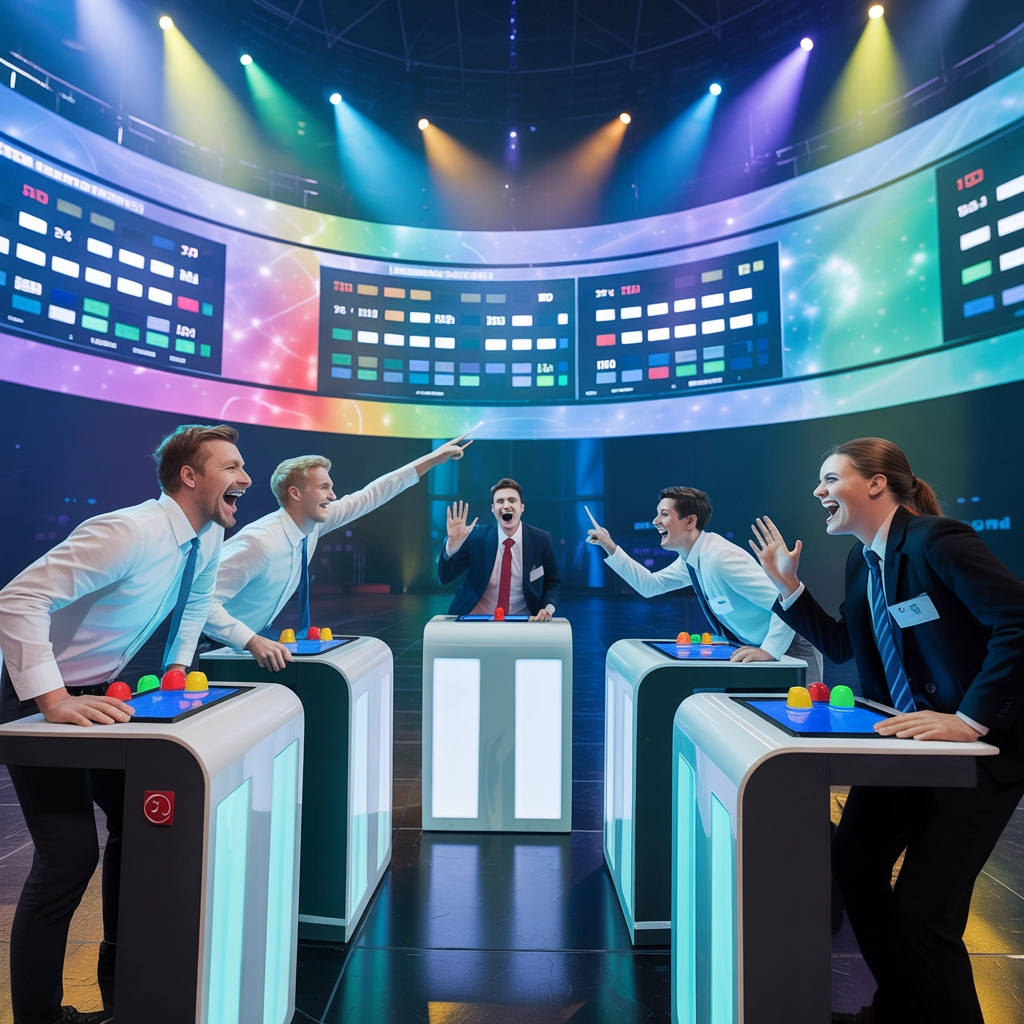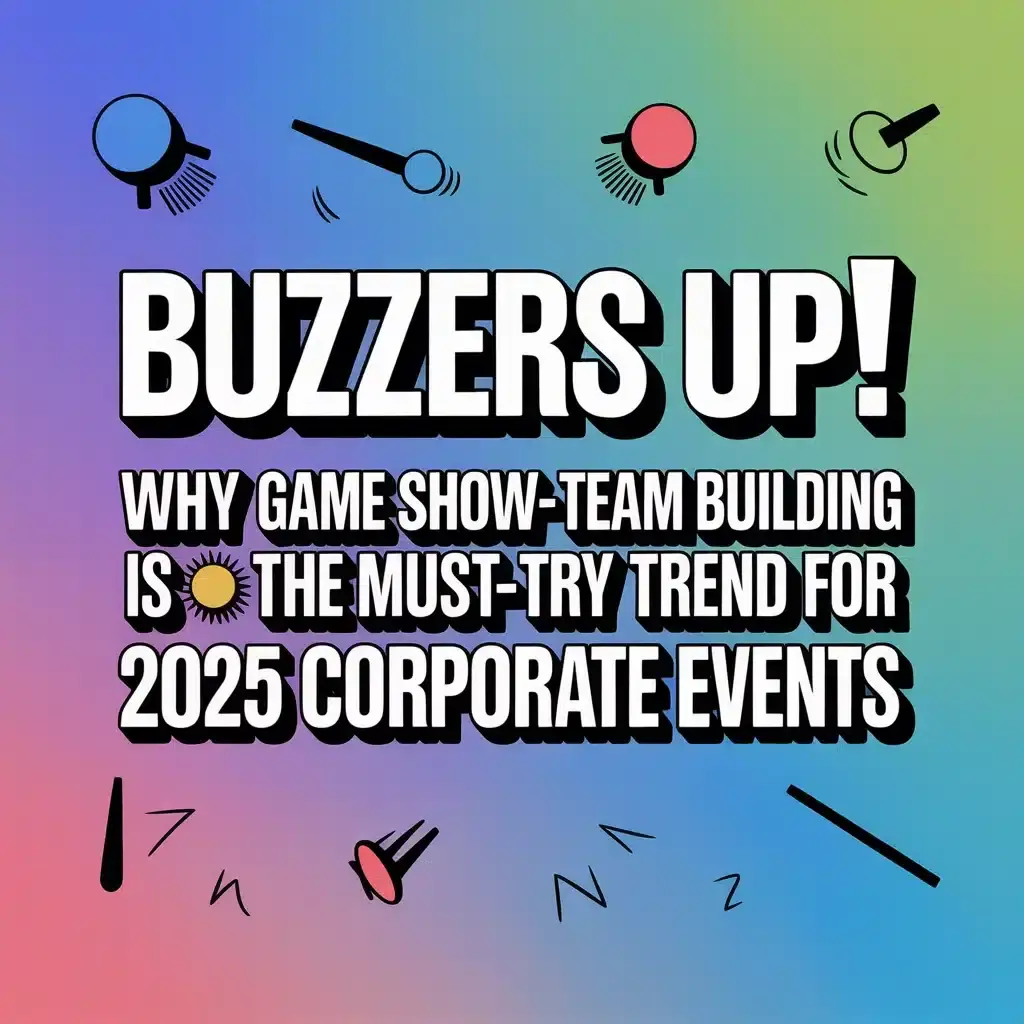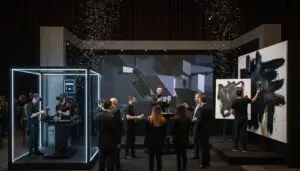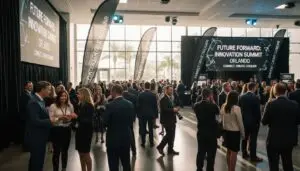The Team Building Revolution Is Being Televised
Remember when team building meant trust falls and awkward icebreakers? Those days are officially over. As we zoom through 2025, forward-thinking companies are ditching the bland bonding exercises for something with a lot more pizzazz: game show-style team building events.
At Game Show Trivolution, we’ve seen firsthand how this electric trend is transforming corporate culture across Florida and beyond. The buzz is real—literally, with actual buzzers—and companies that embrace this energetic approach are reaping benefits that extend far beyond a few hours of fun.
Why Traditional Team Building Often Falls Flat
Let’s face it: traditional team building activities can sometimes feel like mandatory fun. The collective groan when someone announces “we’re going to do some team exercises” is practically universal. But why?
- Passive participation: Many activities allow stronger personalities to dominate while introverts fade into the background
- Disconnect from real work skills: Exercises that don’t translate to workplace dynamics
- Forced enthusiasm: Activities that feel contrived rather than genuinely engaging
- One-size-fits-all approach: Not accounting for diverse personalities, abilities, and interests
The game show format turns these problems on their head, creating an environment where everyone genuinely wants to participate.

Seven Reasons Game Show Team Building Is Taking 2025 By Storm
1. Interactive Immersion That Actually Works
Game shows are inherently participatory. The format itself—complete with professional hosts, colorful buzzers, dynamic music, and visually stunning displays—creates an atmosphere that naturally draws people in. Even your most reluctant team members will find themselves shouting answers and strategizing with colleagues.
“The key difference is that game shows don’t feel like work disguised as play—they feel like genuine entertainment that happens to build team skills,” explains workplace culture expert Dr. Melissa Chen from the Institute for Organizational Psychology. “This authenticity is what makes them so effective.”
2. Communication Under Pressure (Without the Stress)
Modern workplaces frequently require teams to communicate effectively under tight deadlines. Game show formats simulate this pressure in a low-stakes, high-fun environment:
- Quick decision-making on which team member should answer
- Strategic delegation based on knowledge strengths
- Active listening to build on teammates’ contributions
- Concise communication when explaining answers
Unlike actual workplace pressure, the consequences of failure are nothing more than a few lost points and some good-natured ribbing.
3. Breaking Down Hierarchical Barriers
In traditional office settings, hierarchy can stifle innovation and honest communication. During a game show, however, the CEO might need to defer to the intern who happens to be a whiz at pop culture or sports trivia. This temporary flattening of the organizational chart creates lasting impacts on team dynamics.
“We had a VP who discovered his executive assistant was a secret geography genius during our Global Challenge game show,” reports one of our recent corporate clients. “Now he regularly asks for her input on international expansion strategy meetings—something that never would have happened before.”

4. Customizable Experiences For Your Specific Team
The best part about modern game show team building? It’s not one-size-fits-all. At Game Show Trivolution, we tailor our experiences to your company’s specific needs:
- Industry-specific knowledge: Trivia can incorporate questions about your field, products, or company history
- Skill development focus: Games can emphasize the particular skills your team needs to strengthen
- Diverse challenge types: From trivia to physical challenges to creative problems, different formats engage different talents
- Cultural inclusivity: Questions and formats that respect and celebrate your team’s diversity
Whether you’re in Orlando, Tampa, or Fort Lauderdale, we create experiences that feel custom-built for your team.
5. Meaningful Memory-Making
Research consistently shows that shared positive experiences create stronger bonds than shared work alone. Game shows create peak emotional moments—the triumph of getting a difficult answer, the suspense of waiting for scores, the hilarity of watching your normally serious CFO frantically acting out charades.
These emotional peaks become stories that teams tell for years: “Remember when Maria knew all seven state capitals in under 10 seconds?” or “I still can’t believe the IT team swept the music round!”
6. Data-Driven Team Insights
Modern game show formats don’t just provide fun—they can offer valuable insights into team dynamics:
- Which teams communicate most effectively under pressure?
- Which individuals step up as leaders in different scenarios?
- Where are the knowledge gaps and strengths across your organization?
- How do different departments approach problem-solving?
These observations provide actionable intelligence that HR and leadership can use long after the event ends.
7. The Charitable Component
Many of our corporate clients opt to add a charitable element to their game shows, with winning teams earning donations to their chosen causes. This additional layer of meaning transforms a fun activity into something truly impactful.
“Watching our sales and marketing teams compete fiercely but knowing the ultimate winners would be local charities added a beautiful dimension to the whole experience,” shared a recent client from a Fortune 500 financial services company.
Popular Game Show Formats Making Waves in 2025
Music Bingo: The Unexpected Hit
Music Bingo has emerged as one of the most universally beloved game show formats. Instead of numbers, cards feature song titles or artists. When a song plays, players mark the corresponding square. It combines nostalgia, musical knowledge, and the classic satisfaction of yelling “BINGO!”
The beauty of this format is its accessibility—everyone knows how to play bingo, and everyone has musical opinions. We’ve seen fierce debates erupt over whether a particular tune is from the 80s or 90s, creating organic conversations between colleagues who rarely interact.
Classic Trivia With Modern Twists
Traditional trivia formats remain popular but have evolved significantly. Today’s corporate trivia includes:
- Interactive buzzer systems
- High-definition video questions
- Real-time leaderboards
- Multimedia challenges
- Customized question sets
These technological enhancements transform what could be a staid pub quiz into a dynamic, engaging experience reminiscent of the highest-production TV game shows.

Hybrid and Virtual Options
As workplaces continue to embrace remote and hybrid models, game show formats have adapted accordingly. Virtual game shows maintain the energy and interaction of in-person events while accommodating global teams.
Advanced platforms now feature:
- Live hosts interacting with remote participants
- Digital buzzers and answer submission systems
- Breakout rooms for team strategy sessions
- Inclusive formats that ensure remote participants feel equally involved
How to Prepare Your Team for Game Show Success
Want to make the most of your game show team building event? Here are our top tips:
- Mix up the teams thoughtfully: Consider creating cross-departmental groups to build connections across silos
- Set the right tone: Emphasize fun over competition to keep things positive
- Consider knowledge balance: Try to distribute subject matter experts across teams
- Prepare but don’t over-prepare: Let people know what to expect, but leave room for surprise
- Plan the follow-through: Consider how you’ll build on the connections formed during the event
Real Results: Beyond the Buzzers
The impact of game show team building extends far beyond the event itself. Our clients report:
- Increased cross-departmental collaboration on projects
- More comfortable communication across hierarchical levels
- Higher employee satisfaction scores
- Improved problem-solving when under deadline pressure
- Stronger social bonds that translate to better working relationships
As one HR director put it, “We saw more natural team bonding in those three hours than in the previous three months of forced team lunches and standard exercises.”
Make Your Next Corporate Event Unforgettable
As companies plan their 2025 event calendars, game show-style team building isn’t just a fun option—it’s a strategic investment in company culture and team performance.
Whether you’re planning a small department gathering or a company-wide event, the game show format offers unmatched engagement, adaptability, and genuine enjoyment that translates to real workplace benefits.
Ready to bring the high-energy excitement of a professional game show to your next corporate event? Game Show Trivolution brings the lights, cameras, and action directly to your venue—or to your virtual team—with customized experiences designed specifically for your organization’s needs and goals.
Check our availability for your next corporate event and discover why companies across Florida are saying “Buzzers up!” to the team building revolution. The clock is ticking—what will your final answer be?




